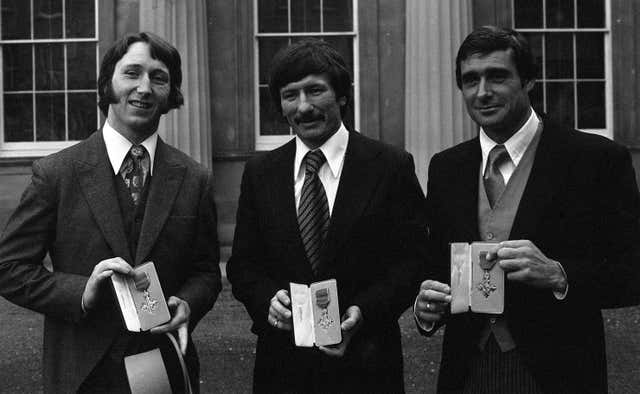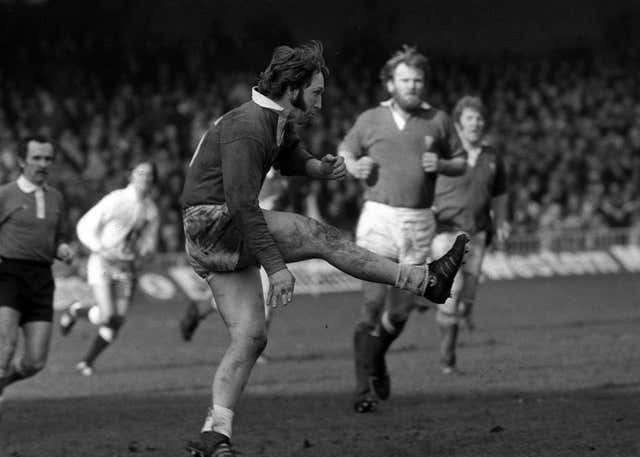JPR Williams: The orthopaedic surgeon who broke bones with Lions and Wales
John Peter Rhys Williams – known simply as JPR and who has died at the age of 74 – was one of Wales’ most celebrated players during his country’s 1970s golden era.
The tough-as-teak full-back gained a worldwide reputation for his fearless defensive play, rock-solid safety under a high ball and attacking prowess that saw him excel alongside fellow household names like Gareth Edwards, Barry John, Phil Bennett and Gerald Davies.
The JPR moniker took effect in 1973 to distinguish him from Wales team-mate John JJ Williams, and it was a rugby career highlighted by him winning 55 Test caps across 12 seasons, being an integral part of successful 1971 and 1974 British and Irish Lions Test teams and taking his place among a small group of Welshmen to win three Grand Slams.
Socks always around his ankles and long sideburns resplendent, he was as popular among rugby supporters as any of his illustrious peers, while away from rugby circles, he became an orthopaedic surgeon and was a Fellow of the Royal College of Surgeons.

It could, though, have been a different sporting story altogether, given Williams’ prowess as a junior tennis player.
Born near the mid-Glamorgan town of Bridgend on March 2, 1949, Williams attended Bridgend Boys Grammar School and then Millfield School in Somerset, underlining his tennis potential by playing in and winning a British junior competition at the All England Club, Wimbledon, beating former Great Britain Davis Cup captain David Lloyd.
But rugby union was to be his calling, which he dovetailed with a career in medicine, qualifying as a physician in 1973 after studying at St Mary’s Hospital Medical School, London, by which time he was firmly established as a trailblazing full-back.
“I used to say that I spent half my life breaking bones on the rugby field, then the other half putting them back together in the operating theatre,” he said in his 2007 book JPR Given The Breaks – My Life In Rugby.
In terms of his club career, JPR was part of a great London Welsh team across the late 1960s and early 1970s, as they beat all-comers with a thrilling brand of rugby that gained its ultimate reward when seven players from the Exiles – JPR included – were selected for the Lions’ 1971 New Zealand tour, led by Welsh coaching mastermind Carwyn James.
Williams went on to play a major role in the four-match Test series, including landing a decisive drop-goal in the final All Blacks clash, which underpinned a 14-14 draw and ensured a 2-1 Test series triumph, a feat that has not been matched since by any touring Lions team to New Zealand.
He had been capped by Wales as a 19-year-old two years earlier, and by the time his decorated international career ended when he retired in 1981, he had carved himself a permanent place in Welsh rugby folklore.
His ability to turn defence into attack through a fearless physical approach won him countless admirers, and Wales knew they could rely on a rock-like player whose bravery under a high ball often showed little thought for his own safety.
Self-preservation was never high on his agenda, as illustrated to full wincing effect when he prevented a certain and likely game-changing try for France wing Jean-Francois Gourdon during a Five Nations match in 1976 by fearlessly barging him into touch at the corner as Gourdon sprinted flat out.
In rugby’s current era, the shoulder-led challenge might well have seen Williams concede a penalty, but it was a moment of raw-boned physicality that inevitably took its place in Welsh rugby’s history books.
Williams’ high pain threshold was graphically underlined during Bridgend’s game against the 1978 touring All Blacks. Having joined the Welsh club two years earlier, he was a key player to their hopes of upsetting New Zealand at the Brewery Field.
But during the game he was stamped on the face by New Zealand prop John Ashworth, leaving Williams requiring 30 stitches – his father Peter, who was a doctor, applied the touchline needlework – before rejoining the action.

That single episode, as ugly as it was, epitomised a player who appeared not to show pain, whether of the physical or mental variety.
Williams captained Wales five times by the time he stepped down from Test rugby – he also went on a second Lions tour, another successful one, to South Africa in 1974 – and boasted a remarkable record of never being on a losing Wales team against England in 10 Tests.
He gained an MBE for his contribution to the sport, and such was his superb natural fitness that he continued playing into his early 50s for village club Tondu, often in the back row, before finally hanging up his boots in 2003.
Like many of his international rugby peers, Williams has done much for charity, highlighted by him climbing Mount Kilimanjaro that saw a six-figure sum raised for the National Society for the Prevention of Cruelty to Children.
Williams, who worked as a consultant at the Princess of Wales Hospital, Bridgend, leaves his wife Scilla and four children.
